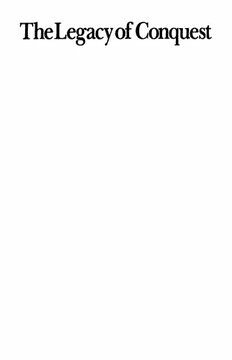Table Of ContentT heL egacyof Conquest
T heL egacyof Conquest
The Unbroken Past ofthe American West
Patricia Nelson Limerick
W • W • NORTON & COMPANY • NEW YORK • LONDON
Copyright © 1987 by Patricia Nelson Limerick. All rights reserved. Published
simultaneously in Canada by Penguin Books Canada Ltd., 2801 John Street,
Markham, Ontario L3R 1B4. Printed in the United States of America.
The text and the display type of this book are composed in Baskerville. Com
position and manufacturing are by The Maple-Vail Book Manufacturing Group.
Book design is by Marjorie J. Flock.
First published as a Norton paperback 1988.
Library of Congress Cataloging-in-Publication Data
Limerick, Patricia Nelson, 1951-
The legacy of conquest.
Bibliography: p
Includes index.
1. West(U.S.)—History. 2. West (U.S.)—Historiography.
I. Title.
F591.L56 1987 978 86-23883
ISBN 0-3T3-304T7-3
W. W. Norton & Company, Inc., 500 Fifth Avenue, New York, N.Y. 10110
W. W. Norton & Company Ltd., 37 Great Russell Street, London WC1B 3NU
3 4 5 6 7 8 9 0
To Jeff Limerick, and to our utterly Western nephews and niece,
Jay, Michael, and Franane
Contents
Acknowledgments 9
Introduction: Closing the Frontier and Opening Western
History 17
Part One • THE CONQUERORS
One Empire of Innocence 35
Two Property Values 55
Three Denial and Dependence 78
Four Uncertain Enterprises 97
Five The Meeting Ground of Past and Present
/74
Part Two • THE CONQUERORS MEET THEIR MATCH
Six The Persistence of Natives 179
Seven America the Borderland 222
Eight Racialism on the Run 259
Nine Mankind the Manager 293
Ten The Burdens of Western American History 322
Notes 35/
Further Reading 369
Index
38y
Acknowledgments
I g o t th e idea fo r this book on June 30, 1981,
at a conference in Idaho called “The American West: Colonies
in Revolt.” During that first day of the conference, government
and business officials complained about the current problems of
the West, and the prevalent presumption seemed to be that these
problems were quite recent in origin and bore little relation to
the distant frontier West. I am grateful to Jeanette Germain for
initiating the process that brought me to Idaho and to William
K. Everson, William Goetzmann, Peter Hassrick, Bruce John
son, Bud Johns, Annick Smith, and, especially, Alvin Josephy,
Richard Harte, and Bob Waite for organizing the event. Those
Sun Valley conferences were one of the best things going in
Western affairs; I deeply regret their disappearance.
At that conference, after listening to the first day’s speakers,
I said in my own speech that the West needed someone compa
rable to C. Vann Woodward to write The Burden of Western
History. The fact is that there is no one comparable to C. Vann
Woodward. But Woodward’s example and his encouragement
early in the project made the difference between a vision that
might have vanished and one that stayed and brought forth at
least limited results.
My adviser, Howard Roberts Lamar, not only read the man-
Acknowledgments
IO
uscript but made it possible. When I left California for graduate
school at Yale, I had no particular interest in the history of my
home region. It was about the luckiest thing that ever happened
to me: to have Howard Lamar show me what I had missed in my
first twenty-one years in the West. As an adviser, Lamar is nearly
unrivaled in academic circles for his kindness, good humor, and
enthusiasm for widely varying approaches to history. The sound
parts of this book are a tribute to his guidance; any tenuous sec
tions are a credit to his tolerance.
Harvard University and the Charles Warren Center gave me
a full year of leave in 1983—84. That year gave me not only
essential working time but working and thinking conditions as
close to heaven as I expect to get. Any time I wanted to test an
idea, I had only to step outside my office to see who was around.
With Bernard Bailyn, Barbara DeWolfe, Pat Denault, Jon Rob
erts, Drew McCoy, Don Bellomy, Alan Brinkley, and Helena Wall
at hand, the intellectual equivalent of a brisk physical workout
was always available. That none of these people found enor
mous significance in the American West only added to the value
of their company, reminding me of what I most hope for in the
way of reader response: not agreement, but spirited discussion.
In 1981, James Thomson, Jr., introduced me to his Nieman
program at Harvard and transformed a minor interest in jour
nalism and current events into a passion. I am grateful as well to
John Seigenthaler and Sid Hurlburt of USA Today for allowing
me to move from consumer to occasional producer in journalis
tic matters, for reacquainting me with brevity, and for providing
the income supplement that allowed me to stay a jump ahead of
library acquisitions.
From the start of this project, Ed Barber and Steve Forman
of Norton have been committed and responsive editors. Ed
Barber’s significance escalated in July of 1984, when I moved
to Boulder and we agreed it was time for him to put the pres
sure on, if this book was to be finished in our lifetimes. He is, the
next two years proved, unrelentingly a man of his word. Relieved
of the obligation to remind me of deadlines, Steve Forman
was an ideal coach, kind and critical without contradiction. I am

